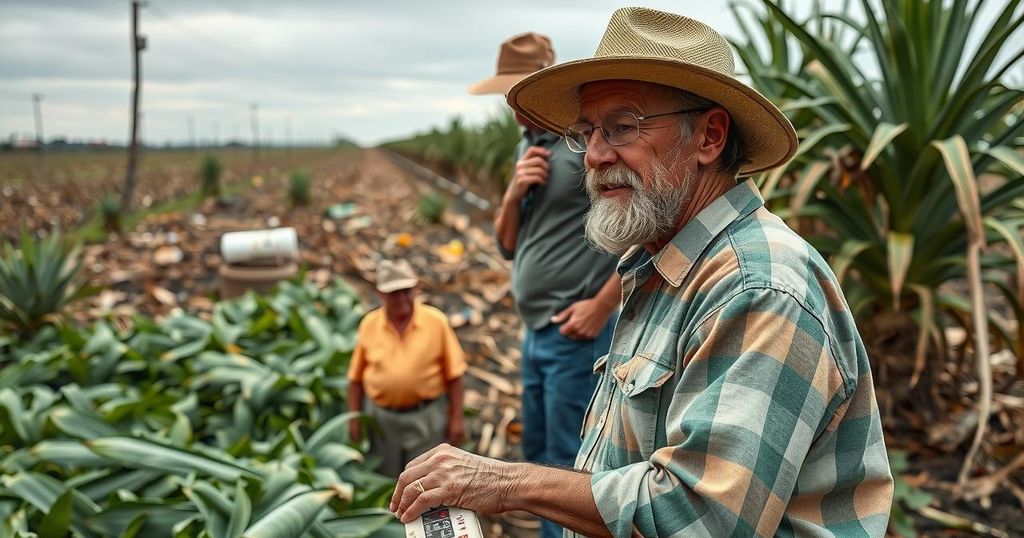Weather
World news
AFRICA, ASSOCIATED PRESS, BROOKINGS REGISTER, CHRIS HOPKINS, EUROPE/ASIA, GEORGIA, HELENE, HOPKINS, HURRICANE BERYL, NATURAL DISASTER, NATURAL DISASTERS, NORTH CAROLINA, POWER OUTAGES, SOUTH AFRICA, SOUTH CAROLINA, TOOMBS COUNTY, UNIVERSITY OF GEORGIA, VIRGINIA, WEATHER
Sofia Rodriguez
0 Comments
Impact of Hurricane Helene on Southern Farmers: A Continuing Struggle
Farmers in Georgia are still grappling with the devastation caused by Hurricane Helene, which occurred more than two months ago. The storm resulted in damages that could exceed $10 billion, significantly impacting crops and livestock, especially cotton and poultry. Assistance from state and federal authorities is being mobilized, but farmers highlight the urgent need for prompt support to aid in their recovery efforts. Despite the severity of losses, consumer prices are expected to remain stable, except for more vulnerable products like pecans.
Farmers in Georgia continue to contend with the aftermath of Hurricane Helene, which wreaked havoc across the South months ago. Chris Hopkins’ farm in Toombs County remains strewn with debris from the hurricane, including twisted agricultural equipment and severed tree limbs. The storm’s impact, particularly on cotton farmers like Hopkins, was detrimental, arriving at the crucial time of the fall harvest. Estimates suggest losses exceeding $10 billion across various agricultural sectors, severely affecting farmers’ capacities to recover.
The destruction has left many farmers, including Hopkins, contemplating their futures, as he has incurred estimated losses of $430,000 just from his cotton crop, in addition to the costs associated with cleaning up debris and repairing equipment. The storm resulted not only in direct crop losses but also devastated poultry production, causing substantial disruption within the processing sector. Overall losses reported include around $683 million to Georgia’s poultry industry alone, highlighting the widespread devastation from Helene.
In response to the disaster, the Georgia government has redirected funds and Congress has allocated additional disaster aid to assist affected farmers. However, some farmers express urgency in receiving assistance, indicating that the long recovery process for the agriculture sector poses significant challenges for their livelihoods. Despite the severity of the damage, experts believe that consumer prices may remain relatively stable due to the availability of crops from other regions, although the situation for specific products such as pecans may differ significantly.
Hurricane Helene struck the southeastern United States on September 26, 2023, making landfall as a Category 4 storm. The hurricane’s aftermath left extensive damage in Georgia and surrounding states, with estimates putting the agricultural losses at substantial figures. The storm resulted in widespread destruction of crops, poultry farms, and agricultural infrastructure, leading to an urgent need for recovery and assistance for local farmers. Various state and federal initiatives have been launched to aid affected agricultural businesses; however, challenges remain.
In summary, Hurricane Helene has left a profound impact on the agricultural landscape of the South, particularly in Georgia. The extent of the damages, coupled with the emotional and financial toll on farmers, presents a challenging environment for recovery. While governmental aid and support initiatives are in motion, the urgency for immediate assistance is palpable among affected farmers who must rebuild in the face of daunting obstacles. The overall agricultural economy in the region demonstrates resilience, yet specific sectors, particularly poultry and pecans, face particular challenges moving forward.
Original Source: brookingsregister.com




Post Comment